
Neil Ellwood Peart was a Canadian and American musician, known as the drummer and primary lyricist of the rock band Rush. He was known to fans by the nickname 'The Professor', derived from the Gilligan's Island character of the same name. His drumming was renowned for its technical proficiency and his live performances for their exacting nature and stamina. Peart earned numerous awards for his musical performances, including an induction into the Modern Drummer Readers Poll Hall of Fame in 1983 at the age of thirty, making him the youngest person ever so honoured.

Rush was a Canadian rock band that primarily comprised Geddy Lee, Alex Lifeson (guitar) and Neil Peart. The band formed in Toronto in 1968 with Lifeson, drummer John Rutsey, and bassist and vocalist Jeff Jones, whom Lee immediately replaced. After Lee joined, the band went through several line-up changes before arriving at its classic power trio line-up with the addition of Peart in July 1974, who replaced Rutsey four months after the release of their self-titled debut album; this line-up remained intact for the remainder of the band's career.
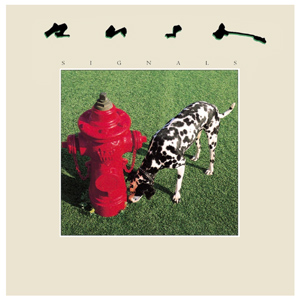
Signals is the ninth studio album by Canadian rock band Rush, released on September 9, 1982 by Anthem Records. After the release of their previous album, Moving Pictures, the band started to prepare material for a follow-up during soundchecks on their 1981 concert tour and during the mixing of their subsequent live album Exit...Stage Left. Signals demonstrates the group's continuing use of synthesizers, sequencers, and other electronic instrumentation. It is the last album produced by their longtime associate Terry Brown, who had worked with them since 1974.

A Farewell to Kings is the fifth studio album by Canadian rock band Rush, released on Anthem Records on August 29, 1977. The album reached No. 11 in Canada and marked a growth in the band's international fanbase, becoming their first Top 40 album in the US and the UK.

Fly by Night is the second studio album by the Canadian rock band Rush, released on February 14, 1975, by Mercury Records. It was the first Rush album to showcase elements of progressive rock for which the band has become known. It was also the first to feature lyricist and drummer Neil Peart, who replaced original drummer John Rutsey the previous summer just prior to the band's first North American tour. Peart took over as Rush's primary lyricist, and the abundance of fantastical and philosophical themes in his compositions contrasted greatly with the simpler hard rock of the band's debut album.
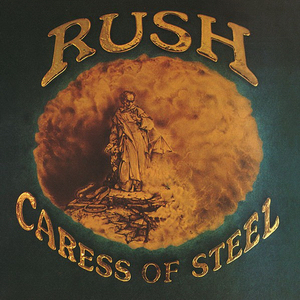
Caress of Steel is the third studio album by Canadian rock band Rush, released on September 24, 1975, by Mercury Records. It was recorded immediately after the band concluded touring in support of their previous album, Fly By Night, and marked a development in the group's sound, moving from the blues-based hard rock style of their debut towards progressive rock. Songs such as "The Necromancer" furthered Rush's advancement into narrative-driven, fantasy-based compositions, while "The Fountain of Lamneth" was their first prog-rock "epic" to span an entire side of vinyl. Other tracks like "Bastille Day" and "Lakeside Park" became staples of the band's live setlists.
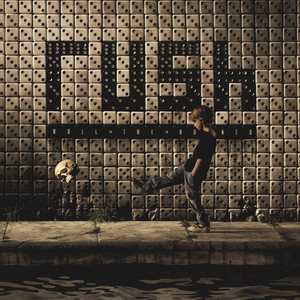
Roll the Bones is the fourteenth studio album by Canadian rock band Rush, released September 3, 1991, on Anthem Records. The band began working on the album after a brief creative hiatus following the tour promoting their previous release, Presto (1989).
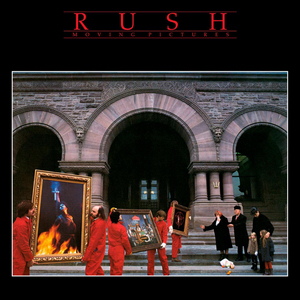
Moving Pictures is the eighth studio album by Canadian rock band Rush, released on February 12, 1981, by Anthem Records. After touring to support their previous album, Permanent Waves (1980), the band started to write and record new material in August 1980 with longtime co-producer Terry Brown. They continued to write songs with a more radio-friendly sound, featuring tighter and shorter song structures compared to their earlier albums.

Exit... Stage Left is the second live album by the Canadian rock band Rush, released as a double album in October 1981 by Anthem Records. After touring in support of their eighth studio album Moving Pictures (1981), the band gathered recordings made over the previous two years and constructed a live release from them with producer Terry Brown. The album features recordings from June 1980 on their Permanent Waves (1980) tour, and from March 1981 on their Moving Pictures tour.

Counterparts is the fifteenth studio album by Canadian rock band Rush, released October 19, 1993, on Anthem Records. After the band finished touring its previous album Roll the Bones (1991) in mid-1992, the members took a break before starting work on a follow-up.
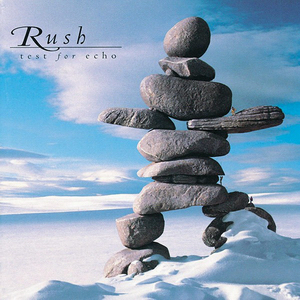
Test for Echo is the sixteenth studio album by the Canadian rock band Rush, released on September 10, 1996, by Anthem Records. It was the final Rush album to be co-produced by Peter Collins. The band supported the album with a world tour in 1996 and 1997, after which they went on a five-year hiatus following the deaths of drummer Neil Peart's daughter and wife, and would not record again until 2001.

"Tom Sawyer" is a song by Canadian rock band Rush, originally released on their 1981 album Moving Pictures as its opener. The band's lead singer, bassist, and keyboardist, Geddy Lee, has referred to the track as the band's "defining piece ... from the early '80s".

"Closer to the Heart" is a song by Canadian rock band Rush. It was released in November 1977 as the lead single from their fifth studio album A Farewell to Kings. It was the first Rush song to feature a non-member as a songwriter in Peter Talbot, a friend of drummer and lyricist Neil Peart. It was Rush's first hit single in the United Kingdom, reaching number 36 in the UK Singles Chart in February 1978. It also peaked at number 45 in Canada and number 76 on the US Billboard Hot 100. It was inducted into the Canadian Songwriters Hall of Fame on March 28, 2010.
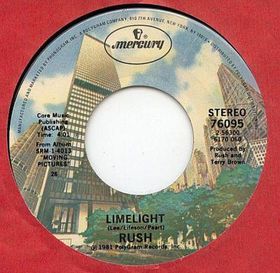
"Limelight" is a song by Canadian progressive rock band Rush. It first appeared on the 1981 album Moving Pictures. The song's lyrics were written by Neil Peart with music written by Geddy Lee and Alex Lifeson. "Limelight" expresses Peart's discomfort with Rush's success and the resulting attention from the public. The song paraphrases the opening lines of the "All the world's a stage" speech from William Shakespeare's play As You Like It. The band had previously used the phrase for its 1976 live album. The lyrics also refer to "the camera eye", the title of the song that follows on the Moving Pictures album.

Snakes & Arrows is the eighteenth studio album by Canadian rock band Rush, released on May 1, 2007, by Anthem Records. After their R30: 30th Anniversary Tour ended in October 2004 the band took a one-year break, during which they agreed to start work on a follow-up in January 2006. The album was recorded in five weeks with co-producer Nick Raskulinecz, a fan of the group who was praised by each member for his approach and technique. It contains three instrumental tracks, the most on any Rush album.

"Mission" is a song by Canadian rock band Rush from the 1987 album Hold Your Fire.
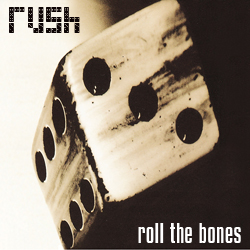
"Roll the Bones" is a song by the Canadian rock band Rush. It was released as the second single from their 1991 album of the same name.

"Stick It Out" is a song and single by the band Rush from their 1993 album Counterparts. The song debuted at number one on the Billboard Album Rock Tracks chart, becoming the band's only number one debut of their five chart-toppers. The song also reached number one on the RPM Cancon chart.

"Force Ten" is a song written, produced and performed by Canadian rock band Rush, released as a promotional single from their album Hold Your Fire. It was the last song written for the album. The song has been critically positively received, and peaked at number 3 on the Billboard Mainstream Rock Tracks chart.



















